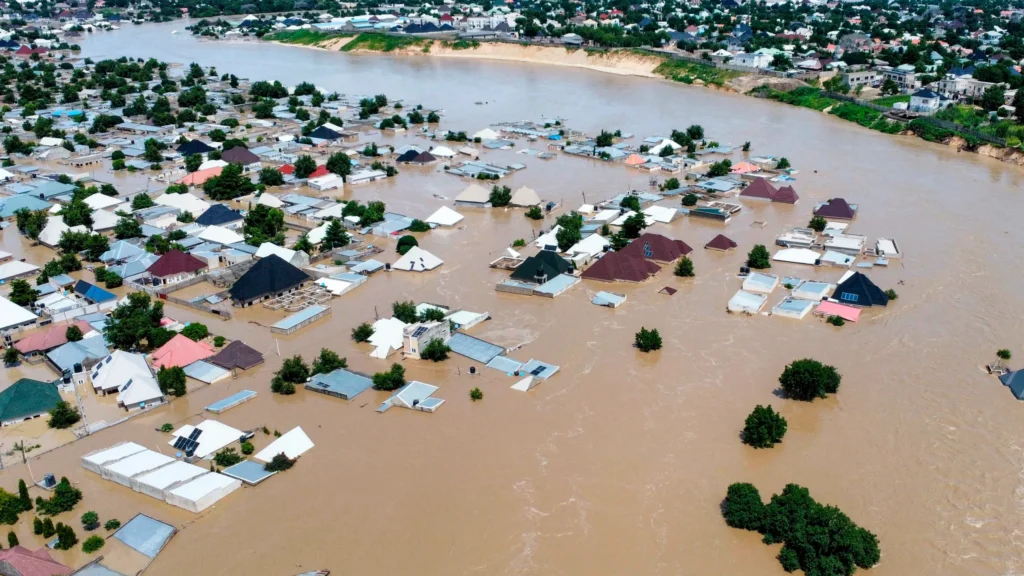When Anas Usman woke up early Thursday morning in Mokwa, he was getting ready to head to the farm. Instead, he found himself wading through murky water, screaming for his missing children. By nightfall, he had buried 17 members of his extended family.
“I don’t even know where the water came from,” he told Punch, his voice hollow with disbelief. “Our house was swallowed whole. Children, women, men-gone.”
At first, it sounded like heavy rain. But by dawn on Wednesday, it was clear to residents of Mokwa, Niger State, that something much more devastating was unfolding.
Torrents of predawn rain, lasting several hours, unleashed massive flooding that has killed at least 111 people in the agrarian town. Located about 380 kilometers west of Abuja, Mokwa is a bustling trading hub where northern farmers sell produce like beans and onions to southern traders. Now, it’s a disaster zone. Dozens remain missing. Homes, roads, and livelihoods – all washed away.
The floodwaters submerged entire neighborhoods, turning homes into death traps. In videos circulating on social media, rooftops barely poke through brown floodwater. Locals waded waist-deep in muddy currents, some carrying children, others salvaging soaked belongings. Victims who spoke to Punch and AP News shared their stories.
“We lost many lives and properties. Those that had farm produce stored up lost everything,” said resident Kazeem Muhammed.
Friday alone saw the burial of at least 44 victims, following the interment of 31 earlier in the week. Local authorities and residents say the actual toll is likely far higher, especially with many almajirai – young Qur’anic pupils – still unaccounted for.
“This flood is beyond anything we’ve ever seen,” said Alhassan Kolo, a classroom teacher in Mokwa. “It’s the poor who’ve suffered the most. Their homes are gone, and many have lost every member of their household.”
Kolo estimates that over 40 corpses were buried just on Friday – and that doesn’t include those still trapped beneath the rubble of collapsed buildings or those whose bodies were carried away entirely.
Salihu Ishaq, a lifelong resident, stood with trembling hands as he recounted how his sister and her three children were swept away.
“We haven’t even found their bodies,” he said. “Since I was born, I’ve never witnessed a tragedy of this scale. Entire villages around Mokwa have been erased.”
‘It’s like Spiritual water’
“This is not ordinary water,” said Aliki Musa, a Mokwa community leader, echoing a sentiment many locals have voiced. “It’s like spiritual water. It only comes once in twenty years. But when it comes, it brings destruction.”
Musa’s fears reflect a larger concern: climate change. Communities in northern Nigeria have suffered from prolonged dry spells, followed by sudden, excessive rainfall during the short wet season. The result? Floods that are increasingly deadly and unpredictable.
The Nigerian Hydrological Services Agency has not yet published exact rainfall data for the storm, but emergency officials say the death toll is likely to rise. According to Niger State Emergency Agency (NSEMA) spokesman Ibrahim Audu Husseini, “more bodies have just been brought and are yet to be counted.”
The devastation was concentrated in Mokwa town, especially in the communities of Tiffin Maza and Anguwan Hausawa, where over 50 residential buildings were swept away, many with people still inside.
Mokwa’s importance goes beyond its population – it is a major trade artery connecting northern food producers to southern markets. With roads washed away and the critical Tatabu Bridge destroyed, the flooding has severed key supply chains at the start of the rainy season, when food prices already begin to climb.
Jonathan Vatsa, spokesperson for Governor Mohammed Bago, confirmed the collapse of the Ilorin road, the only viable link from Mokwa to the Southwest. “The entire state is in mourning,” he said. “This is not just a local disaster. It affects food movement across Nigeria.”
He urged federal intervention, noting that the scale of the devastation is beyond what the state can handle alone.
Government response
Deputy Governor Yakubu Garba visited Mokwa on Friday and confirmed that over 100 people had died. He assured displaced residents that relief supplies from NEMA were being distributed and more assistance was on the way.
President Bola Tinubu, in a statement issued by Minister of Information Mohammed Idris, has ordered NEMA, the military, and other federal agencies to scale up rescue and relief efforts.
“Our immediate priority is to save lives and stabilize the area,” the statement read. “We commend the courage of first responders and volunteers who continue to risk everything to help.”
Meanwhile, NSEMA’s DG Abdullahi Baba-Arah said more than 21 bodies had already been recovered, and others are still being searched for. Survivors are being treated for injuries and trauma at Mokwa General Hospital.
Poor response to disaster
Experts say the disaster could have been mitigated. Jibril Muregi, chairman of Mokwa Local Government, told Premium Times that construction of flood-control infrastructure is long overdue.
“This critical infrastructure is essential to protecting lives and property,” he said. “Had we acted earlier, we may have reduced the scale of this tragedy.”
The Mokwa disaster follows a broader pattern. In September 2024, torrential rains and a dam collapse in Maiduguri caused massive flooding that killed over 30 people and displaced thousands already impacted by the Boko Haram crisis.
And in 2022, over 600 lives were lost, and more than a million people displaced nationwide due to flooding. As climate extremes become more frequent, the tragedy in Mokwa is both a humanitarian emergency and a warning shot. The cost of inaction – in lives and livelihoods – is growing.
“We’re used to managing with little,” said Ishaq. “But this? This is too much.”

